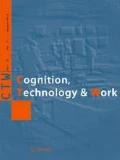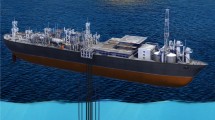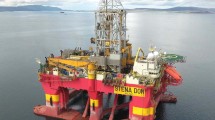Abstract
Workplaces in the oil and gas (O&G) industry have evolved to become part of the modern complex sociotechnical system that characterises onshore and offshore facilities today. The intense interactions between workers, systems, equipment and processes have made companies in this sector more productive. However, significant and complex risks have also emerged. Managing them requires a methodology capable of understanding and recognising how this entire sociotechnical system works. This research uses the FRAM to model the activities performed by drillers, from the perspective of their workplace, inside the drilling unit of an offshore oil rig—a complex sociotechnical system. The interviews, on-board observations and data gathering performed as part of this study provided information that was used to build a FRAM model capable of representing the real work done by drillers inside the doghouses on offshore oil rigs. Through this model, the variability of human behaviour could be analysed in the context of the different situations that may happen, enabling researchers to understand the specific demands of the work and the correlation between WAI and WAD that naturally emerges. This FRAM-based analysis acknowledges that human factors and non-technical skills are responsible for the productive and safe execution of the work in both normal and critical operations situations, and identifies the impact of this variability—positive or negative—in the execution of daily tasks. It shows that workers’ varied responses can properly deal with complex system demands both in normal situations and in emergencies.


Source: Armstrong, 1941

Source: Authors, 2020

Source: Authors, 2020

Source: Authors, 2020

Source: Authors, 2020

Source: Authors, 2020

Source: Authors, 2020

Source: Authors, 2020
Similar content being viewed by others
References
Armstrong, E. R. (1941) ‘Offshore Oil Drilling Rig U.S. Patent #US 2,248,051’. United States: United States Patent and Trademark Office.
ARPANSA (2017) ARPANSA Regulatory Guide Holistic Safety, Camberra—AU.
Brinkmann S, Kvale S (2009) InterViews: learning the craft of qualitative research interviewing, 2nd Editio. SAGE Publications Inc., Thousand Oaks
Crandall B, Klein GA, Hoffman RR (2006) Working minds: a practitioner’s guide to cognitive task analysis, 1st Editio. MIT Press A Bradford Book, Cambridge
Creswell JW, Creswell JD (2017) Research design: qualitative, quantitative, and mixed methods approaches, 5th Editio. SAGE Publications Inc, Thousand Oaks
Dekker SWA (2015) ‘The danger of losing situation awareness’, Cognition, Technology and Work. Springer, London 17(2):159–161. https://doi.org/10.1007/s10111-015-0320-8
De Vries L (2017) Work as Done? Understanding the practice of sociotechnical work in the maritime domain. J Cognitive Eng Decision Making 11(3):270–295. https://doi.org/10.1177/1555343417707664
Endsley MR (1995) Toward a theory of situation awareness in dynamic systems. Hum Factors 37(1):32–64. https://doi.org/10.1518/001872095779049543
Endsley MR (2015) Situation awareness misconceptions and misunderstandings. J Cognitive Eng Decision Making 9(1):4–32. https://doi.org/10.1177/1555343415572631
Flin R, O’ Connor P, Crichton M (2016) Safety at the sharp end: a guide to non-technical skills, Taylor & Francis Group, CRC Press London
França JEM et al (2019) ‘FRAM AHP approach to analyse offshore oil well drilling and construction focused on human factors’, Cognition, Technology & Work. Springer London. https://doi.org/10.1007/s10111-019-00594-z
França, J. E. M. and Hollnagel, E. (2019) Recognition and analysis of human factors and non-technical skills using the functional resonance analysis method—FRAM. In: IX international conference on knowledge and innovation—ciKi. Porto Alegre, Brazil: PUC-RS.
Hill, R. (2018) ‘FMV® - FRAM Model Visualizer’. Zerprize. https://www.zerprize.co.nz/FRAM/index.html.
Hinton J et al (2018) Getting to Zero and Beyond. J Petrol Technol 70(09):66–72. https://doi.org/10.2118/0918-0066-jpt
Hollnagel E (2009) The ETTO principle: efficiency-thoroughness trade-off. Ashgate, London
Hollnagel E (2012) FRAM: the functional resonance analysis method: modelling complex socio-technical systems, 1st Editio. Ashgate, New York
Hollnagel E (2014) Human factors/ergonomics as a systems discipline ? “ The human use of human beings ” revisited. Appl Ergonomics Elsevier Ltd 45(1):40–44. https://doi.org/10.1016/j.apergo.2013.03.024
Hollnagel E, Woods DD (2005) Joint cognitive systems: foundations of cognitive systems engineering. Foundations of Cognitive Systems Engineering, Joint Cognitive Systems, pp 1–223
IOGP (2018) Demystifying human factors : Building confidence in human factors investigation understand facilitate.
Luquetti dos Santos IJA et al (2013) Human factors applied to alarm panel modernization of nuclear control room. J Loss Prevention Process Industries Elsevier Ltd 26(6):1308–1320. https://doi.org/10.1016/j.jlp.2013.07.017
Lustgarten A (2012) Run to failure: BP and the making of the deepwater horizon disaster. W. W. Norton & Company, New York
Morris, C. (2020) ‘Oil giant may lose millions after drill pipe accident off South Island coast’, Star News, (February), pp 2–5. https://www.odt.co.nz/star-news/star-national/oil-giant-may-lose-millions-after-drill-pipe-accident-south-island-coast.
Nemeth CP (2004) Human factors methods for design: making systems human-centered. Taylor & Francis/CRC Press, Boca Raton, FL
Pasman HJ, Rogers WJ, Mannan MS (2017) Risk assessment: What is it worth? Shall we just do away with it, or can it do a better job? Saf Sci Elsevier Ltd 99:140–155. https://doi.org/10.1016/j.ssci.2017.01.011
Ramzali N, Lavasani MRM, Ghodousi J (2015) Safety barriers analysis of offshore drilling system by employing Fuzzy event tree analysis, Saf Sci Elsevier Ltd 78:49–59. https://doi.org/10.1016/j.ssci.2015.04.004
Roberts A (2018) Evolution: the human story, Revised edn. Penguin Random House, New York
Salas E, Dietz AS (2011) Situational awareness, 1st Editio. Ashgate Publishing Ltd., London
Saldanha MCW et al (October 2019) (2020) ‘Understanding and improving safety in artisanal fishing: a safety-II approach in raft fishing’. Saf Sci Elsevier 122:104522. https://doi.org/10.1016/j.ssci.2019.104522
Silverman D (2017) Doing Qualitative Research, 5th Editio. SAGE Publications Inc, Thousand Oaks
Sneddon A, Mearns K, Flin R (2006) Situation awareness and safety in offshore drill crews. Cogn Technol Work 8(4):255–267. https://doi.org/10.1007/s10111-006-0040-1
Strand GO, Lundteigen MA (2016) Human factors modelling in offshore drilling operations. J Loss Prevention Process Industries Elsevier Ltd 43:654–667. https://doi.org/10.1016/j.jlp.2016.06.013
Turner BA, Pidgeon NF (1997) Man-Made Disasters, Second Edi. Butterworth-Heinemann
Wickens CD et al (2016) Engineering Psychology and Human Performance, 4th Editio. Psychology Press, New York, Harper Collins
Wooldridge AR et al (2019) Complexity of the pediatric trauma care process: implications for multi-level awareness’. Cognition Technol Work Springer Lond 21(3):397–416. https://doi.org/10.1007/s10111-018-0520-0
Zheng Z, Tian J, Zhao T (2016) Refining operation guidelines with model-checking-aided FRAM to improve manufacturing processes: a case study for aeroengine blade forging. Cognition Technol Work Springer Lond 18(4):777–791. https://doi.org/10.1007/s10111-016-0391-1
Author information
Authors and Affiliations
Corresponding author
Additional information
Publisher's Note
Springer Nature remains neutral with regard to jurisdictional claims in published maps and institutional affiliations.
Rights and permissions
About this article
Cite this article
França, J.E.M., Hollnagel, E., dos Santos, I.J.A.L. et al. Analysing human factors and non-technical skills in offshore drilling operations using FRAM (functional resonance analysis method). Cogn Tech Work 23, 553–566 (2021). https://doi.org/10.1007/s10111-020-00638-9
Received:
Accepted:
Published:
Issue Date:
DOI: https://doi.org/10.1007/s10111-020-00638-9




